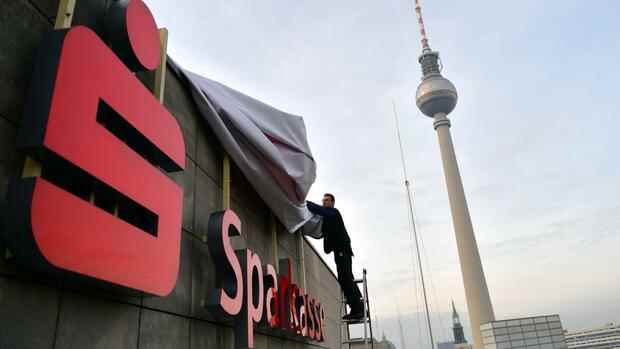The Berliner Sparkasse expects numerous bank accounts to be opened for Ukrainian refugees. “We are preparing for a larger rush and are planning a separate location for this group of people.”
(Photo: dpa)
Frankfurt German banks are preparing to open thousands of accounts for refugees from Ukraine. The Berliner Sparkasse has already set up accounts for refugees, the public bank explained to the Handelsblatt. “We are preparing for a larger rush and are planning a separate location for this group of people.”
The Berliner Volksbank also expects “increased demand for account openings by refugees”. The largest German Volksbank explained: “This also means that the bank’s colleagues who speak Ukrainian or Russian are deployed.”
Ukrainian refugees are allowed to work in Germany and receive social benefits. Many of them arrive in Berlin, which is why financial institutions from the capital are currently receiving a particularly large number of inquiries.
In order to be able to act with legal certainty, the German banking industry (DK) has asked the financial supervisory authority Bafin that a Ukrainian identity card is sufficient as proof of identity for opening basic accounts. “Since many refugees only have this document, this is very helpful, because it gives all refugees from Ukraine the opportunity to open a basic account,” explained the DK, the joint interest group of the German banking associations.
Top jobs of the day
Find the best jobs now and
be notified by email.
The Financial Supervisory Authority complied with this request. For the financial institutions it monitors, there will be no regulatory consequences “if they accept a valid Ukrainian identity card for money laundering identification when opening basic accounts,” the authority said.
Banks are pushing for a “quick fix” when changing money
According to the Money Laundering Act, Ukrainians should actually present a passport to open an account. However, most refugees do not have a passport.
Alternatively, proof of arrival under the Asylum Act would also be permitted for a basic account. However, due to the large number of refugees, it could be difficult to obtain such proof of arrival in a timely manner. Basic accounts should be open to everyone and are usually managed on a credit basis. The Bafin stated that with its statement it wanted to support “the current humanitarian measures to take in refugees from the Ukrainian crisis area”.
The savings banks in particular opened many “refugee accounts”, as they were often called, in 2015 and 2016, when many people from Syria, Iraq and Afghanistan came to Germany. At that time, the financial supervisory authority had classified several documents from German immigration authorities as sufficient for proof of identity.
At the moment, Ukrainians still have great difficulties when they want to exchange the local currency, the hryvnia, for euros. This is currently not possible with the vast majority of banks and exchange offices – simply because there has been no demand for it so far.
However, some of the refugees have withdrawn large amounts of cash in Ukraine – and would now like to exchange it and deposit it into bank accounts. The DK explained that it had already approached the Federal Ministry of Finance, the Bundesbank and the Bafin about the issue. “Here, too, a quick solution would be very desirable in the interests of the Ukrainian refugees.”
More: Deutsche Bank quantifies its Russia risks for the first time
